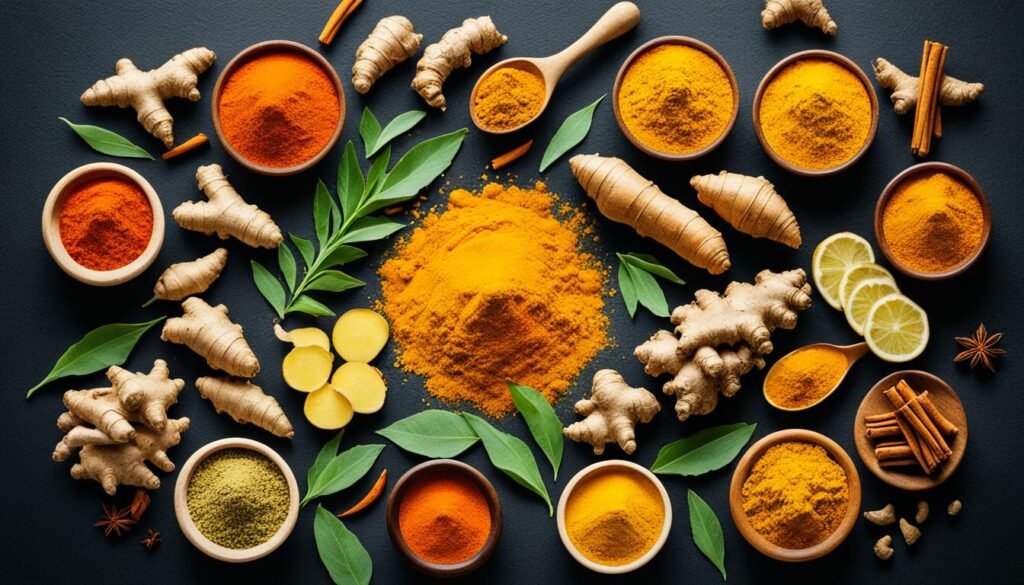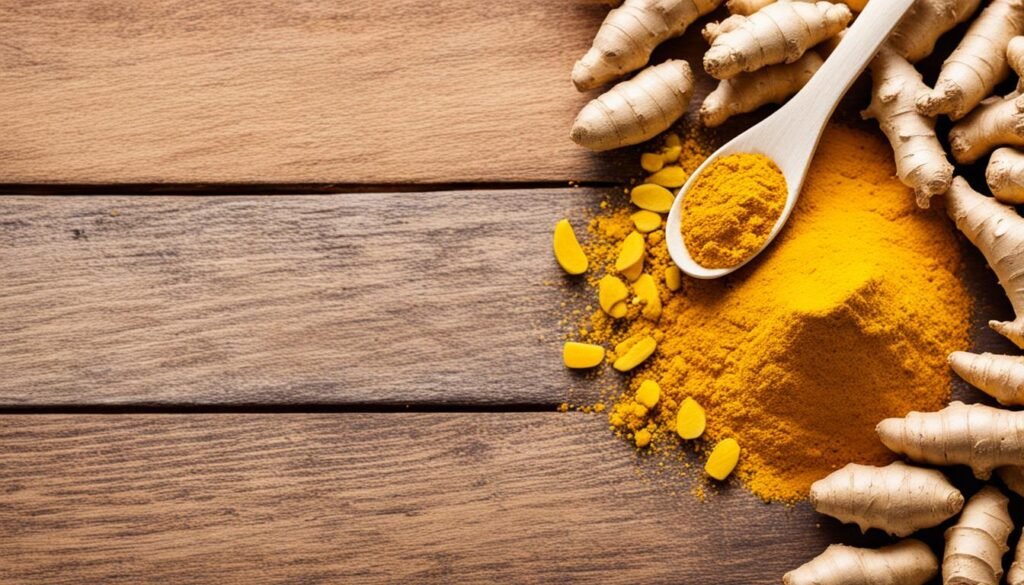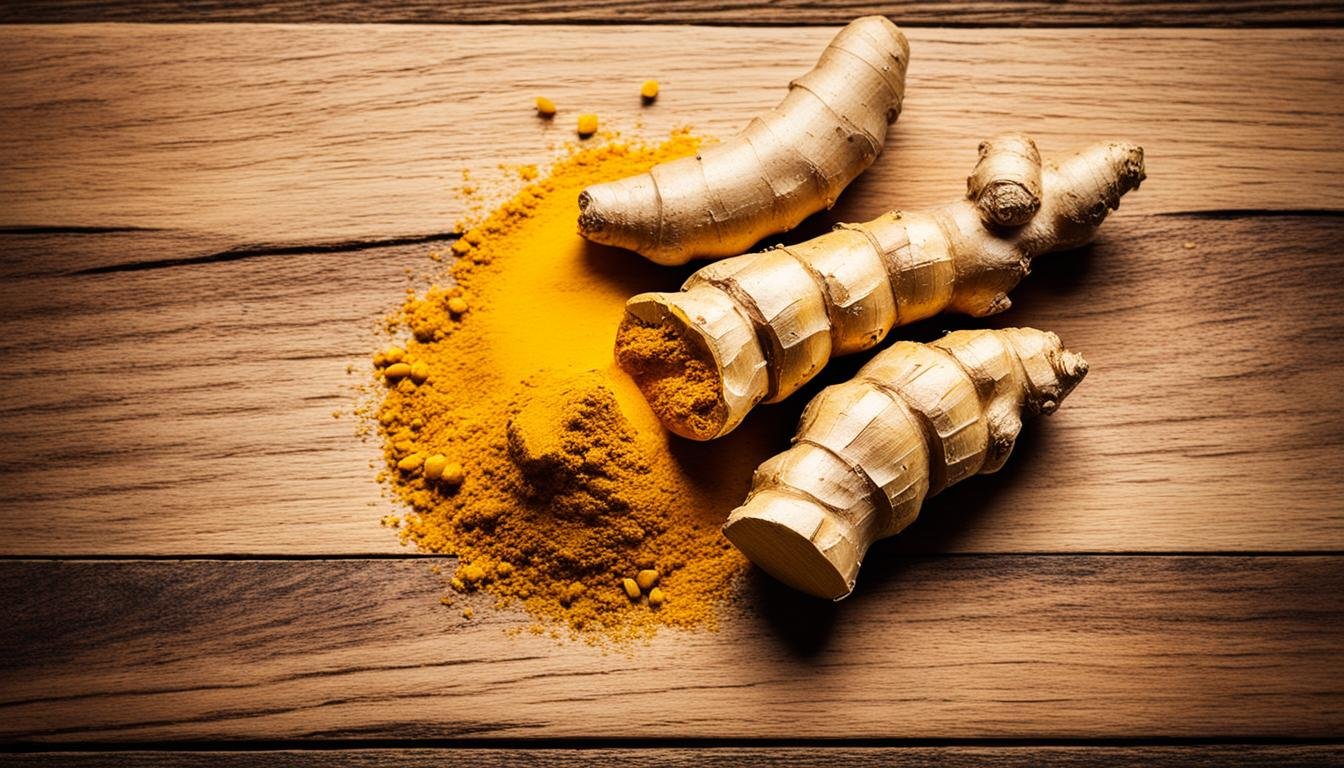Ginger and turmeric are spices that have been used for a long time in Asian medicine. They’re popular today because of their health benefits. But is it better to use them separately? Mixing these spices might make their good effects less?
Both spices fall under Zingiberaceae, the same plant family. They’re powerful against inflammation, as antioxidants, and for our digestion. Combining them, however, may not be so great, according to new studies.
When you put ginger and turmeric together, their compounds might not be absorbed well. This could mean they don’t work as expected when taken at the same time. So, should we rethink how we use these spices for our health?
Introduction to Ginger and Turmeric
Ginger is a key spice in many kitchens and has a rich history in medicine. It comes from Southeast Asia and is known for its powerful abilities to fight inflammation and act as an antioxidant. Its magic comes from ingredients like gingerol. Turmeric, also from the same plant family, is called the “golden spice” because of its yellow color. It includes curcumin, which is top-notch for fighting inflammation.
Ginger: A Versatile Spice with Medicinal Properties
For ages, ginger has been used in Asian traditional medicine. It’s famous for easing digestive and respiratory issues. The secret lies in gingerol, which works wonders as an anti-inflammatory and an antioxidant.
Turmeric: The Golden Spice with Anti-Inflammatory Prowess
Turmeric is well-loved for its health advantages, especially in Indian dishes. Its star player, curcumin, is exceptional at reducing inflammation. This has shown promise in managing conditions like arthritis and Alzheimer’s disease.

Potential Benefits of Combining Ginger and Turmeric
New studies show that eating ginger and turmeric at the same time might be better than eating them alone. These two spices, part of the Zingiberaceae family, mix well to bring a lot of good effects.
Synergistic Anti-Inflammatory Effects
Ginger and turmeric are famous for fighting inflammation. Together, their powers can be even stronger. This helps with diseases like arthritis, heart issues, and some cancers.
Enhanced Antioxidant Activity
They are also great at stopping the damage that free radicals cause. When used together, they might give you more protection against aging and health problems. This is thanks to their strong antioxidant defense system.
Improved Digestive Health
Using ginger and turmeric together may improve your stomach health. Ginger is calming for the gut, and turmeric can reduce inflammation. This mix could help you feel better overall.

Taking Ginger and Turmeric Together: Decreases Their Benefits
Ginger and turmeric each have their own amazing health benefits. However, when taken together, their power might lessen. Compounds in ginger and turmeric could interact in a way that makes them less effective. So, using them together might not provide the usual anti-inflammatory or antioxidant advantages.
Potential Interactions and Reduced Absorption
The active elements in ginger and turmeric, like gingerol and curcumin, might not work as well together. This could mean they’re not as good at fighting inflammation or stress. Scientists are still figuring out how and why this happens.
Contradictory Research Findings
Research on using ginger and turmeric at the same time is scarce. And the findings are sometimes opposite; some say they work better together, others say they’re less powerful. This confusion shows we need more studies to figure out if combining these spices is good or bad.

Proper Dosage and Administration
When taking ginger and turmeric supplements together, the proper dose is not clear. Research on their combined use is still limited. Studies do offer guidance on how much of each spice to take alone.
Recommended Dosages for Ginger and Turmeric
Turmeric shows benefits with doses from 500 to 8,000 milligrams a day. People often take turmeric extract at 1,500 mg daily. Ginger’s usual dose is from 500 mg to 3 grams each day.
Starting with small doses and increasing gradually is key. Consuming too much ginger or turmeric might have side effects.
Enhancing Bioavailability with Black Pepper
Black pepper can boost the body’s use of curcumin from turmeric. Adding black pepper to ginger and turmeric can make them more effective. Piperine in black pepper helps your body absorb curcumin. This means you can better enjoy turmeric’s health benefits.

Precautions and Side Effects
Ginger and turmeric are safe for most people when used in small amounts. But, taking too much in supplement form could bring on side effects. It’s wise to be mindful of this before using them.
Potential Interactions with Medications
If you’re on diabetes medications or blood thinners, be careful. Ginger might change how your blood clots and your blood sugar. Always talk to your doctor before adding ginger and turmeric supplements to your routine.
Gastrointestinal Discomfort
Taking a lot of ginger and turmeric can upset your stomach. This might show up as pain, burning, or diarrhea in your belly. Begin with small amounts and slowly increase. This lets you see how your body reacts.
Quality and Third-Party Testing
The supplement industry isn’t tightly regulated. So, picking third-party tested products is key. It guarantees the products are pure and strong. This step is vital for your safety and the effectiveness of what you’re taking.
Conclusion
Ginger and turmeric are powerful spices with ancient uses in medicine. They bring down inflammation, boost antioxidants, and help the stomach. But, mixing them without care might lower their power because they can interfere with each other.
When you add ginger and turmeric to your diet, check on how much you use. And watch out for side effects and drug interactions. Since supplements aren’t tightly regulated, get your products from trusted sources that test for quality.
There’s still much we don’t know about how ginger and turmeric work together. They might make a good team in some ways, but we need more study to be sure. So, the best advice is to keep looking into how these spices really mix.
